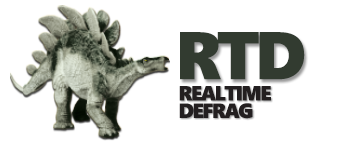RealTime Defrag | RTD (z/OS or Db2) provides automatic and easily controlled z/OS DASD volume maintenance for the 24×7 operating environment, without the disruption to production schedules which legacy defrag and volume maintenance products engender, and with high throughput due to its advanced multiple address space architecture. Today the availability and reliability of your organization’s data is critical to its success. But finding the time required to keep your systems operating efficiently often strains a data center’s resources and its ability to meet service level agreements. In order to utilize available resources more efficiently, more and more computer centers are optimizing their disk space with RealTime Defrag (RTD).
RTD/zOS Version 8.7.0 is a complete replacement for RTD/zOS 8.6.0 and earlier releases, and includes the following optional features:
♦ RP – Remote Pair FlashCopy option provides full support for devices using Remote Pair FlashCopy to maintain business continuity in z/OS environments with continuous dataset operations. FRO is a pre-requisite for PM.
♦ FRO – The Fast Replication Option allows optimal I/O performance and reduced dataset enqueue contention by letting I/O operations run as a background task in the I/O device controller, rather than being executed by channel programs in an RTD address space. Since the operation is almost instantly complete from the viewpoint of RTD processing, datasets are enqueued for significantly shorter periods when data movement takes place. FRO supports FlashCopy devices.
♦ MAS – Multiple Address Space Support allows concurrent processing of up to 28 volumes and circumvents the MVS TIOT size limit which restricts the number of allocations (about 3,200) within an address space.
The main new features of RTD/zOS Version 8.7.0 are as follow:
Started Task (STC)
-
- The major new feature in this version is support for XRC/RP (Extended Remote Copy/Global Mirror Remote Pair FlashCopy). This now enables RTD to perform data movement via FlashCopy for XRC connections, when the Remote Pair feature is available.
RTD now provides new parameters in support of this feature. The Volume Level SET statement now provides the XRC=YES/NO parameter to specify use of FlashCopy for an XRC primary volume. The XPRIM Volume Level INCLUDE/EXCLUDE parameter enables selection of an active XRC primary volume. The Parameter PPRIM has been added to provide consistency for the PPRC primary volume case. The existing parameter APRIM is still present but is now deprecated and may be removed from the product at some future date. The FROCAP Volume Level INCLUDE/EXCLUDE parameter now supports XRC/RP via the existing RP option. In addition, the FROCAPX parameter with options XRP, PRP; RP or NONE (for XRC/RP or PPRC/PM capable, RP = both; NONE = neither) has been added. If any FROCAPX option is set the FROCAP=RP option will also be set.
- The major new feature in this version is support for XRC/RP (Extended Remote Copy/Global Mirror Remote Pair FlashCopy). This now enables RTD to perform data movement via FlashCopy for XRC connections, when the Remote Pair feature is available.
-
- Extended COMBINE. The COMBINE function has been enhanced to allow “combine-in-place” for any number of contiguous but separate extents. (Previously combine-in-place only occurred if all extents for the dataset were contiguous on the volume). In addition, space for the complete output dataset can now occupy up to ten output extents, rather than the previous three (with the IN3XT parameter). All existing COMBINE options can be used in the dataset level SET Statement COMBINE parameter. Additionally, the numerical options 1 to 10 may be specified, which define the maximum number of extents to remain after the COMBINE operation. In this case (for values 1-10) RTD will first attempt to do enough “in-place” combines to reach the specified total number of output extents. If it cannot do this it will allocate space for up to the specified number of output extents and do normal data movement. The specification COMBINE=YES is now equivalent to COMBINE=1. COMBINE=IN3XT is now equivalent to COMBINE=3./p>
-
- The method used to perform serialization of VSAM datasets has been completely rewritten. Instead of using various SYSVSAM resources, RTD now extracts all related components and their cluster names from the catalogue and performs a standard SYSDSN ENQ on them. This will result in significantly fewer ENQs being issued altogether, and avoid Abends which very occasionally occur on opening a VSAM Dataset due to a SYSVSAM ENQ being held by RTD. Note however that RTD uses the old method with SYSVSAM if the Global Control Specifications “Use DYNALLOC to serialize datasets” option is specified in the RTDISPF dialog.
RTDISPF Dialog
-
- A number of small changes have been made to the dialog. These include issuing a warning if the specification member is edited, but “END” is executed before a TRANSLATE has been done. The LOG EXTRACT function now ensures that RTDD20I messages showing the current configuration are included, even if not within the specified range of the EXTRACT operation.
Your current RTD/zOS Version 8.1.0, 8.3.0, 8.5.0, or 8.6.0 password IS VALID for RTD/zOS Version 8.7.0. If you are running RTD/RIO Version 8.0.0 or earlier, your password IS NOT VALID for RTD/zOS Version 8.7.0. Please send the output from the z/OS operator command “D M=CPU” to support@staging.dino-software.com. Your new password will be generated and sent to you.
Should you wish to test the Remote Pair FlashCopy Option (RP), the Fast Replication Option (FRO) with support for FlashCopy or Multiple Address Space (MAS) support, please contact support@staging.dino-software.com so that we can provide you with the appropriate password data.
RTD End of Service Dates are:
♦ Product maintenance support for RTD/z/OS Version 8.6.0x will terminate on 01 March 2022.
♦ Product maintenance support for all RTD versions prior to RTD/zOS Version 8.6.0x has been terminated.
* RTD is owned by INTERCHIP AG

